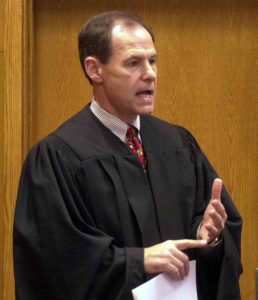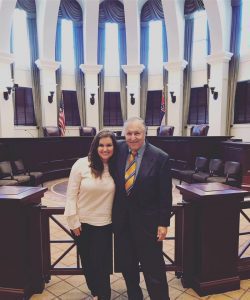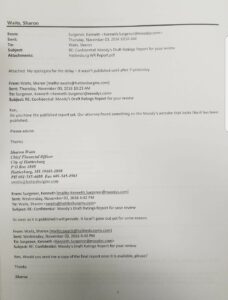
The Forrest County Sheriff’s Department is no stranger to charges of corruption, and not just by those who have run afoul of the law or found themselves in the Department’s crosshairs. Earlier this year, when sentencing Charles Bolton, U.S. District Court Judge Keith Starrett weighed in by stating on the record that there has been a
“culture of corruption in the Forrest County Jail,”
which is run by the Forrest County Sheriff’s Department and called the “Billy McGee Law Enforcement Complex.” Judge Starrett went on to say,
“There are good people in Forrest County that deserve honest government. They deserve people to be straight up with the resources of the county….”[1]

Now comes the news that the Department’s employment of Nick Calico, Sheriff Billy McGee’s son-in-law, is apparently so improper that it is expressly prohibited by both the Mississippi Constitution and the state’s “conflict of interest” laws. Those laws are designed to instill public confidence in the integrity of government, and to prevent elected officials from using their offices to unlawfully benefit themselves or their relatives. When a public official breaks those laws, he violates the “public trust,” and the punishment for doing so is severe.
- The Mississippi Ethics in Government Act.
The Mississippi Ethics in Government Act[2] (commonly called the “conflict of interest laws”) strictly prohibits any “public servant” from “us[ing] his official position to obtain, or attempt to obtain, pecuniary benefit for … any relative or any business with which he is associated.”[3] Under the Act, Nick Calico is a “relative” and his salary is a “pecuniary benefit.”[4] As the Mississippi Ethics Commission has unequivocally stated,
“[W]hen an employee works under the direct supervision of his or her relative, a violation of Section 25-4-105(1) is virtually inevitable.”[5]
Why? Because “[t]he sheriff may be obligated to approve time sheets, pay adjustments or reimbursement for his [relative], in addition to periodically reviewing his job performance. The sheriff may be responsible for approving his [relative’s] work schedules and could possibly show preference to his [relative] in these day-to-day actions required by his position. Any of those actions would result in a violation of Section 25-4-105(1). Typically, a public servant can avoid violating Section 25-4-105(1) by recusing himself or herself from the matter in issue. However, recusal under these facts is impractical if not impossible in light of the sheriff’s daily supervisory responsibilities over his employees.[6]
2. The Mississippi Constitution.
Article IV, Section 109 of the Mississippi Constitution states that
“[n]o public officer … shall be interested, directly or indirectly, in any contract with the state, or any district, county, city, or town thereof authorized by any law passed or order made by any board of which he may be or may have been a member, during the term for which he shall have been chosen, or within one year after the expiration of such term.”
In simplified terms, Sheriff McGee has a personal interest in his daughter’s well being; so her husband’s contract with the county is also a constitutional violation.
To constitute a violation of Section 109, the “contract” doesn’t have to be a formal written agreement, but is defined as “[a]ny agreement to which the government is a party; or [a]ny agreement on behalf of the government which involves the payment of public funds.”[7] The “government” includes Forrest County, and Billy McGee is a “public servant.”[8]
-
Possible Punishment.
Any “contract” made in violation of the Ethics in Government Act may be declared null and void by a court of competent jurisdiction,[9] and the offending public servant (such as McGee) is additionally subject to: (a) civil fines up to $10,000; (b) censure or removal from of elected public official from office, and/or for unelected public official (such as Calico), censure, removal from office, suspension, reduction of pay or demotion by a circuit court of competent jurisdiction;[10] and (c) by separate civil action by the Attorney General or any governmental entity, damages, forfeiture of any pecuniary interest received by the violator, and in the discretion of the court, court costs and reasonable attorneys’ fees.[11]
The Mississippi Supreme Court’s opinion in Hinds Community College Dist. v. Muse, 725 So. 2d 207 (Miss. 1998), indicates just how severely violations of the Ethics in Government Act are punished. There, the wife of the president of Hinds County Community College was employed as a teacher for 13 years, during which time she was paid a total of $311,709. The Attorney General charged the president of violating Section 25-4-105, and sought disgorgement of the entire amount his wife had been paid.
The Muses claimed that they had acted in good faith, and that since Mrs. Muse had provided quality services for the salary she had received, the State had suffered no damages. The Supreme Court rejected the Muses’ arguments, and held that good faith, long practice, and value received are not defenses to violations of the Ethics in Government Act. Rather, the State did not have to show monetary damages to prevail under the Act. The injury is the damage that self-dealing does to the public trust, and this injury occurs even where the government has received full value for any money spent.
“The legislative directive focuses on the wrongful gain to the violative public servant as a measure of damages to the public trust. The injury is the loss of public trust; the damages are the benefits wrongfully gained.”[12]
The Muse opinion tells us that it is simply irrelevant in this case whether Forrest County suffered financial loss from the employment of Calico, or whether the services he has provided benefited Forrest County. Neither good faith, long practice, or value received are defenses to violations of the Ethics in Government Act. Sheriff McGee’s son in law, Nick Calico, just like in the Muse case, will have to repay all of his compensation since the day he married Sheriff McGee’s daughter. Furthermore, either he and/or Sheriff McGee will have to resign.
-
Procedure.
The Ethics in Government Act allows any citizen to file a complaint with the Mississippi Ethics Commission.[13] If probable cause exists “for [the] belief that a violation of law has occurred,” the Commission must refer the complaint and any evidence obtained during its investigation to the Mississippi Attorney General and the district attorney having jurisdiction.[14] The Commission must also submit “a recommendation that [the alleged violation] be considered for presentation to the grand jury, as well as any further recommendations for seeking civil remedies.”[15] The Commission, Attorney General, or any governmental entity that has been harmed may file a complaint in the circuit court of the county in which the violation occurred.[16]
-
Mississippi’s “Nepotism Statute.”
At first glance, it might appear that Calico’s employment also violates Mississippi’s “nepotism statute,” which makes it unlawful for an elected official in charge of a department to employ close relatives within that department.[17] But unless Calico has received a raise or promotion since November 2016 when he became McGee’s son-in-law, McGee may get a pass there, because the statute contains a “grandfather clause” which arguably exempts Calico.[18] However, the Ethics in Government Act contains no such exception,[19] and the nepotism statute allows some situations that are strictly prohibited by the Act. Therefore, a public official can still be punished under the Act even if he is found not to have violated the nepotism statute.[20]
6. Conclusion
Conflicts of interest by elected officials are so repugnant to our democratic system of government that the legislature has called efforts to “realize personal gain through official conduct” to be a violation of “public trust.”[21] And the Mississippi Supreme Court has called nepotism and self-dealing by public officials “two of the more pernicious threats to our democratic ideals.”[22]
Citizens have the right to demand that our public officials carry out their duties in an ethical manner.[23] Ensuring that they do so, and holding them accountable if they don’t, is the Hattiesburg Patriots’ primary reason for existence – its raison d’être. This site will continue to fulfill its mission, especially when our elected officials appear to have violated laws as fundamental as this.
[adrotate group=”5″]
The below document Ethics Opinions
ethics-opinions[adrotate banner=”1359″]
The below document 25-1-53-Employment of relatives prohibited; exceptions
HP-25-1-53-Employment-of-relatives-prohibited-exceptions[adrotate banner=”1359″]
The below document 25-4-101 Legislative Declaration
HP-25-4-101-Legislative-declaration[adrotate group=”5″]
The below document 25-4-103-Definitions
HP-25-4-103-Definitions[adrotate banner=”1359″]
The below document 25-4-105 Contract restrictions and other prohibited conduct penalties
HP-25-4-105-Contract-restrictions-and-other-prohibited-conduct-penalties[adrotate group=”5″]
The below document 25-4-109 Fines and other penalties
HP-25-4-109-Fines-and-other-penalties[adrotate banner=”1359″]
The below document 25-4-113 Civil actions against violators costs and attorney fees
HP-25-4-113-Civil-actions-against-violators-costs-and-attorney-fees[adrotate group=”5″]
The below document Board of Trustees of State Institutions of Higher Learning v Ray
HP-Board-of-Trustees-of-State-Institutions-of-Higher-Learning-v-Ray[adrotate banner=”1359″]
The below document City of Jackson v Greene
HP-City-of-Jackson-v-Greene[adrotate group=”5″]
The below document Hinds Community College Dist v Muse
HP-Hinds-Community-College-Dist-v-Muse[adrotate banner=”1359″]
Footnotes:
[1] Transcript of Sentencing Hearing, March 17, 2017, United States v. Bolton, in the U.S. District Court for the Southern District of Mississippi, Eastern Division, Criminal Action No. 2:16-cr-0007-KS-MTP.
[2] Miss. Code Ann. §§ 25-4-101, et seq.
[3] Id. § 25-4-105(1).
[4] Id. § 25-4-103 (l), (p), and (q).
[5] Miss. Ethics Op. No. 11-076-E (Jan. 6, 2012) (emphasis added).
[6] Id. (emphasis added).
[7] Miss. Code Ann. § 25-4-103(f).
[8] Id. § 25-4-103(g), (p).
[9] Miss. Code Ann. § 25-4-105(6).
[10] Id. § 25–4–109.
[11] Id. § 25–4–113.
[12] Muse, 725 So. 2d at 211.
[13] Id. § 25–4–19.
[14] Id. § 25–4–21.
[15] Id.
[16] Id. §§ 25-4-107, 25–4–19(g)(ii), & 25–4–113; Bd. of Tr. of State Inst. of Higher Learning v. Ray, 809 So. 2d 627, 634 (Miss. 2002).
[17] Miss. Code Ann. § 25-1-53 (prohibiting employment of person related to department head by blood or marriage “within the third degree”).
[18] Id. § 25-1-53 (“This section shall not apply to any employee who shall have been in said department … prior to the time his or her kinsman … became the head of said department ….”); see Op. Atty. Gen. No. 2002-0580, Keating (Oct. 11, 2002).
[19] Miss. Ethics Op. No. 05-053-E (July 22, 2005).
[20] Miss. Ethics Op. No. 11-076-E (Jan. 6, 2012); Miss. Ethics Op. No. 10-092-E (Sept. 10, 2010).
[21] Miss. Code Ann. § 25-4-101 (emphasis added).
[22] Hinds Community College Dist. v. Muse, 725 So. 2d 207, 211 (Miss. 1998).
[23] City of Jackson v. Greene, 869 So. 2d 1020, 1026 (Miss. 2004).










